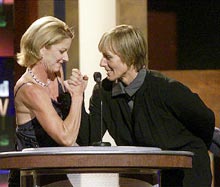Chris Evert and Martina Navratilova were ice and fire.
As two of the greatest rivals in 20th century sport, they goaded each other to greatness but still stayed friends.
 They played together 80 times. Navratilova was the Queen of Wimbledon, Evert the champion on clay.
They played together 80 times. Navratilova was the Queen of Wimbledon, Evert the champion on clay.
For 12 years in a row, one or the other was ranked world number one. They tied with 18 Grand Slam titles each.
"If you tried to make the perfect rivalry, we were it," said Navratilova. "We brought out the best in each other."
Now, 20 years after Navratilova and Evert last met in a Wimbledon final, American sports journalist Johnette Howard has penned "The Rivals" which dissects their intense clashes.
Howard, reflecting on the pair, concluded: "They were two people who fervently wanted the same thing, found the other blocking the way and ultimately forgave each other for it."
Joe Frazier's fights with Muhammad Ali were the stuff of boxing legend.
"But how many times did Ali and Frazier fight?" Navratilova once asked, knowing full well that the answer was just three.
Evert and Navratilova met in 60 finals. For sheer longevity, their rivalry eclipsed Pete Sampras against Andre Agassi, John McEnroe against Bjorn Borg.
ICE MAIDEN
What made their rivalry so enthralling was the sharp divergence between the two, both on and off court.
Evert, nicknamed "The Ice Maiden" and "Little Miss Metronome", was the nation's sweetheart, an All-American blonde from a strict Catholic upbringing.
The teenager's squeaky clean image stuck long afterwards with Evert complaining: "I was given a public personality before I ever had a chance to develop one myself.
"I'm not as goody two-shoes as people think," said Evert whose path to true love certainly was not a smooth one.
As a teenager, she fell for Jimmy Connors, the loudmouth bad boy of tennis, but the relationship soon crumbled.
She first went up the aisle after a whirlwind romance with British tennis player John Lloyd. But, as divorce loomed, she was the first to admit "I was married to my tennis".
Navratilova then introduced her to former US Olympic downhill skier Andy Mill. They are now married with three sons.
On the opposite side of the net was Martina Navratilova, the Czech defector and openly gay athlete who said: "I have always had this outrage at being told what to do, how to act, who to love."
Her lovers ranged from a professional golfer to a basketball player and a Texan beauty queen. Among the members of Team Navratilova who transformed her into a superbly honed athlete was a transsexual ophthalmologist.
The differences between the two tennis champions were equally stark on court.
Navratilova was the swashbuckling serve-and-volleyer who rushed impetuously to the net on every possible occasion.
She wore her heart on her sleeve. "I remember Martina was really aggressive, real emotional, she screamed at herself on the court all the time," Evert recalled.
EQUALITY FIGHT
The cool, controlled Evert was the queen of the baseline. At times she looked glued to it. She wore her rivals down with grinding accuracy.
Above all, she boasted a remorseless will to win.
When journeyman player Paula Smith once sat down in the locker room after being beaten by Evert, she said: "Thank God my happiness doesn't depend on a tennis match."
"Thank God mine does," Evert snapped back.
With Billie Jean King leading the fight for equality in tennis, she had two perfect personalities in Navratilova and Evert to promote the women's game.
In today's climate, it is difficult to imagine what an uphill climb they all faced.
Howard quotes America's Wimbledon champion Stan Smith who complained to one British newspaper: "These tennis girls would be much happier if they settled down, got married and had a family.
"Tennis is a tough life and it really isn't good for them. It de-feminizes them."
The abiding impression left by Howard's book is of the mutual respect that has endured between Navratilova and Evert. Both players are left to offer their own epitaphs on the unlikely chemistry.
Evert said of Navratilova: "Never once, no matter how tough the loss, never once has one of us said to the other 'I'm sorry, can you leave me alone?'"
Navratilova said of Evert: "I still have a closeness with her that I will never have with another human being because of what we went through together on and off court."
Photograph: Reuters/Mike Segar/POOL








 © 2025
© 2025